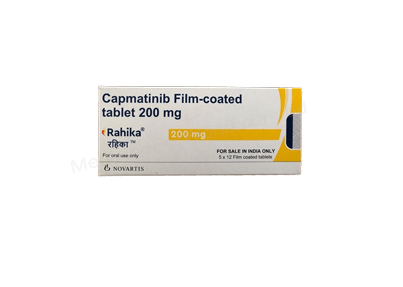Don't miss our holiday offer - up to 50% OFF!
Capmatinib 200 Mg Tablet

This medication is used to treat a certain type of lung cancer (non-small cell lung cancer-NSCLC). Capmatinib works by slowing or stopping the growth of cancer cells. It belongs to a class of drugs known as kinase inhibitors.
How to use Capmatinib 200 Mg Tablet
Read the Patient Information Leaflet if available from your pharmacist before you start using capmatinib and each time you get a refill. If you have any questions, ask your doctor or pharmacist.
Take this medication by mouth with or without food as directed by your doctor, usually twice daily. Swallow the tablets whole. Do not crush, chew, or break the tablets.
The dosage is based on your medical condition and response to treatment. If you have certain side effects, your doctor may adjust your dose or stop treatment for some time.
Do not increase your dose or use this drug more often or for longer than prescribed. Your condition will not improve any faster, and your risk of serious side effects will increase.
If you vomit your dose of capmatinib, do not take another dose. Take your next dose at your regular scheduled time. Do not take two doses at the same time.
Take this medication regularly to get the most benefit from it. To help you remember, take it at the same times each day.
Since this drug can be absorbed through the skin and lungs and may harm an unborn baby, women who are pregnant or who may become pregnant should not handle this medication or breathe the dust from the tablets.
Swelling hands/ankles/feet, muscle/joint pain, tiredness, fever, nausea/vomiting, decreased appetite, weight loss, constipation, or diarrhea may occur. If any of these effects last or get worse, tell your doctor or pharmacist promptly.
People using this medication may have serious side effects. However, you have been prescribed this drug because your doctor has judged that the benefit to you is greater than the risk of side effects. Careful monitoring by your doctor may decrease your risk.
Tell your doctor right away if you have any serious side effects, including: new or worsening lung problems (such as shortness of breath, chest pain, cough), signs of liver or pancreas problems (such as nausea/vomiting that doesn’t stop, stomach/abdominal pain, yellowing eyes/skin, dark urine).
A very serious allergic reaction to this drug is rare. However, get medical help right away if you notice any symptoms of a serious allergic reaction, including: rash, itching/swelling (especially of the face/tongue/throat), severe dizziness, trouble breathing.
This is not a complete list of possible side effects. If you notice other effects not listed above, contact your doctor or pharmacist.
Precautions
Before taking capmatinib, tell your doctor or pharmacist if you are allergic to it; or if you have any other allergies. This product may contain inactive ingredients, which can cause allergic reactions or other problems. Talk to your pharmacist for more details.
Before using this medication, tell your doctor or pharmacist your medical history, especially of: liver disease, lung problems, disease of the pancreas (pancreatitis).
Before having surgery, tell your doctor or dentist about all the products you use (including prescription drugs, nonprescription drugs, and herbal products).
This medication may make you more sensitive to the sun. Limit your time in the sun. Avoid tanning booths and sunlamps. Use sunscreen and wear protective clothing when outdoors. Tell your doctor right away if you get sunburned or have skin blisters/redness. Ask your doctor for details.
Since this drug can be absorbed through the skin and lungs and may harm an unborn baby, women who are pregnant or who may become pregnant should not handle this medication or breathe the dust from the tablets.
Precautions
Before taking capmatinib, tell your doctor or pharmacist if you are allergic to it; or if you have any other allergies. This product may contain inactive ingredients, which can cause allergic reactions or other problems. Talk to your pharmacist for more details.
Before using this medication, tell your doctor or pharmacist your medical history, especially of: liver disease, lung problems, disease of the pancreas (pancreatitis).
Before having surgery, tell your doctor or dentist about all the products you use (including prescription drugs, nonprescription drugs, and herbal products).
This medication may make you more sensitive to the sun. Limit your time in the sun. Avoid tanning booths and sunlamps. Use sunscreen and wear protective clothing when outdoors. Tell your doctor right away if you get sunburned or have skin blisters/redness. Ask your doctor for details.
Since this drug can be absorbed through the skin and lungs and may harm an unborn baby, women who are pregnant or who may become pregnant should not handle this medication or breathe the dust from the tablets.
Tell your doctor if you are pregnant or plan to become pregnant. You should not become pregnant while using capmatinib. Capmatinib may harm an unborn baby. Your doctor should order a pregnancy test before you start this medication. Men and women using this medication should ask about reliable forms of birth control during treatment and for 1 week after the last dose. If you or your partner becomes pregnant, talk to your doctor right away about the risks and benefits of this medication.
It is unknown if this drug passes into breast milk. Because of the possible risk to the infant, breastfeeding is not recommended while using this drug and for 1 week after the last dose. Consult your doctor before breastfeeding.

